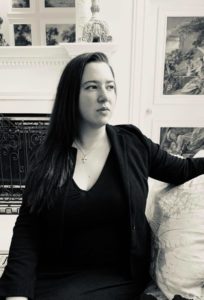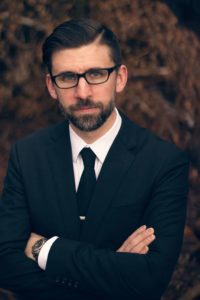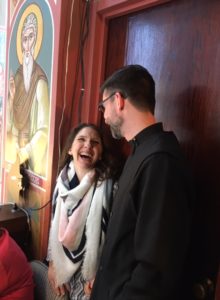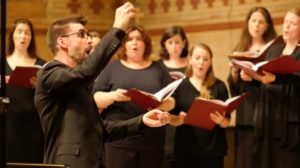Orthodox Music in America’s 40 Under 40: Olivia Insignares
Christ is risen!
We launched our Orthodox Music in America’s 40 Under 40 series of profiles back in February, and then a couple of things have happened in the world since that you might be aware of that slowed us down. Now that we’re at least on the other side of Lent, however, we’re going to get back into this with some purpose, and we’re going to finish out 2020 with this series completed.
Olivia Insignares is a student at St. Tikhon’s Orthodox Theological Seminary, but at 29, she’s already a highly experienced and skilled singer and conductor who brings together a number of qualities common to the generation of Orthodox musician we’re profiling. She takes this liturgical craft seriously spiritually and professionally, she is flexible with respect to musical idiom, she has a broad skill set, she believes strongly that beautiful music is a necessary component of beautiful worship, and that this is both a gift to the faithful and a tool for evangelizing the world at large.
We spoke to Olivia over the phone on March 11 2020. N.B. — we interviewed her right before the long-term consequences of the pandemic became clear, so she refers to events that had been upcoming for summer 2020 that, alas, were subsequently cancelled, postponed, or reconceived.
Your name for the record:
Olivia Insignares.
When is your birthday?
My birthday is July 29, 1990.
What do you do and where do you do it?
At the seminary, I’m a student conductor and I sing in nearly every ensemble here at St. Tikhon’s. There are about five different choirs. And it’s interesting because I’m an alto, too, but I sing with a male quartet. I think it is possible that I may be the only woman right now in the OCA that sings regularly with a normally all-male ensemble with music settings for male choir. So, I’m learning a lot of male choir repertoire, which is not something I think that most women get the chance to immerse themselves in. Usually when you become a choir director in any capacity in the church, you’re pitching for mixed choir and learning how to sing with a mixed choir because that’s our tradition. But I’ve had this unique opportunity at seminary to be working with some profoundly historic male choir repertoire, which is very cool. I would love to continue to conduct male ensembles or use these ideas for different voicings for treble voices as well in the future.
Before I came to seminary, I worked as a hired singer in different capacities. I’ve been a part of different sacred music projects across the board, but also opera chorus work, jazz ensembles, folk groups, children choir directing, recital work, etc… all sorts of things. Over the past five years I’ve been able to sing with the different professional Orthodox choirs that we have here in the U.S. I’ve been on four or five different recordings with these groups — PaTRAM, the Saint Tikhon Choir, and so on. Just recently I sang with the newly formed Artefact Ensemble and directed the first piece of the beginning of the Rachmaninoff Vigil during our first major concert. I never thought I’d be taking my first bow as a conductor and not just as a singer before the throne of God, but there I was! So there are a few different activities I’m currently involved with.
Although, I’ve always considered myself a singer; I went to seminary because I wanted to get more of a theological basis for how we understand music in the church, liturgics, and the importance of beauty in the world. And in that process, I’ve actually started to grow more towards conducting. I have this opportunity to train under mentors like Benedict Sheehan for this, and to get exposure to the breadth of our Orthodox liturgical music tradition on a larger scale, while also getting the rubrical knowledge I need for my seminary training.
The bulk of the academic work that I’m doing here from my classes independently is based on the theology of beauty. My vocation is directly related to the liturgical music of the church, and that has brought a greater awareness of how our understanding of beauty really is unique as Orthodox Christians. Then the question becomes, how do we create spaces where we can participate in that beauty more? These are the questions I’m wrestling with right now.
What motivates you to do what you do?
I just called what I do a “vocation”, and a vocation is a calling. It is a pull. I think of what I do as a church musician in terms of the greater framework of what it really means to live an anaphoric life — a life that is offered up to God. When I’m involved with the concert projects I participate in, and all of us are singing at a very high level of quality, and we are also singing the music of our church, which is a product of the composer’s own faith, full of the radiant beauty of Christ, and then you take this music and bring it to the Divine Liturgy — then, and really then are you truly offering yourself up in a type of anaphoric movement. And every single human being has this capacity. I’m not saying that you have to go into iconography just because you’re an artist. But every person that is granted the skill set to create good work of art at a high level can lift these gifts back to God in their own way. Recently, I saw a short comic strip with a real theme of Orthodoxy, done in the style of a graphic novel. It was entirely edifying and refreshing to see a new medium being used to communicate the truths of the spiritual life. But I guess for myself personally, I feel indebted to use the skills I’ve learned and give them back to God at the highest level I possibly can, which originated for me, in choral music. And that approach has blessed me immensely in my life.
How did music draw you in initially?
My family told me I sang before I spoke, and I distinctly remember putting on my father’s headphones and blasting some classical music while conducting the walls of our small apartment as a child. Music is a part of being an Insignares. All of my family members play instruments, especially the guitar, and I don’t think there is a single Insignares that doesn’t, you could say it is in our blood. At family gatherings we sit around all afternoon into the evening and play music. My grandfather of blessed memory had a beautiful tenor voice, and we still have recordings which the whole family treasures.
But practically speaking, I was an undergrad music student at College of Charleston in Charleston, South Carolina, which had a great choral program. My conductor, had a very close relationship with Dr. Joseph Flummerfelt of Westminster Choir College. Dr. Flummerfelt would always come to Charleston for the Spoleto Festival, and he conducted one of the semi-professional choirs that I sang with in Charleston just a few months before he passed away. So there’s a bit of a connection there.
The first time I walked into an Orthodox Church, it just so happened that it was Holy Ascension Orthodox Church in Mount Pleasant, SC, where Benedict was the director at the time. He knew me from a previous house gathering and he came over and said, “You’re a music major, right?” I said yes, and he said, “Ok, I need more altos.” So, I went up to the analogion, the first time in an Orthodox church mind you, and it was so, so different from any other choral liturgical experience I’d ever had. I remember going home and listening to the Canon of St. Andrew of Crete , listening to the kontakion over and over again. I realized that this beauty exists specifically in this time, and it comes back every year. That is, if you want to hear this kontakion sung, you have to be there, the first week of Lent. Sure, there are other times when the Canon gets sung later during Lent, but it’s not an experience you can just buy or hear at a concert hall. It gave me this idea of a sacred sound space that happens in the church during certain times of the year — like on Christmas vigil, with the big “God Is With Us”. These are moments that you can’t really replicate. They are unique soundscapes. They happen in one time, in one space and then you have to wait almost an entire season for them to come back again.
I’m a direct product of inviting non-Orthodox singers into the church choir and it being accidental evangelism! I’m a definite supporter of the idea that we need to have good singers come, that we need to have trained musicians come and sing in our choirs. Beauty will attract people who value beauty. If you have beautiful church music at your church, if you have beautiful iconography, if you take the time to make a beautiful building with beautiful architecture, if you yourself are a beautiful person through your hospitality to a stranger, people will not be able to keep themselves away.
I’m a daughter of immigrants. My family is from Colombia, South America, but also from Italy and Ireland. But even with the immigrant’s mentality of survival, my grandmother would never just, you know, put a plate of food in front of you; it would be put in a nice bowl, with a plate underneath, with a napkin, and she’d make it a certain way. And maybe she would give you bread, or pour you a glass of wine — there was a way that Sunday dinner was done, almost as a liturgical procession. It is a type of ‘holy time’ that goes beyond the utility of it. Along those lines, I believe that human beings, when we truly love something, we will ornament it — but, as a monk once told me, it’s not just about the dress, signifying the ornament; you have to have the lady in the dress, signifying the spiritual reality, the service. We have our faith, we have the Divine Liturgy, and as liturgical artists, we’re the seamstresses making the wedding dress, adorning the bride of Christ with our hymnody, skills, energy, and craft. The learning of this craft has to be done in a place where others are already focusing on it. I’m developing my technique as a choir director and as a singer of our tradition, but all that technique, all the purpose of the beauty of the art, is to adorn the Divine Liturgy. If we truly love God, then we will want to put energy towards making our worship of Him truly magnificent.
What are the projects you’re working on right now that you haven’t already told me about?
I’m looking forward to going to the International Society for Orthodox Church Music Pan-Orthodox Symposium at St. Vladimir’s Seminary in June. Then I’m spending three months at St. Seraphim of Sarov in Santa Rosa with Father Lawrence Margitich. And also, I hope to see Fr. Stephan Meholick and other priests who have definitely created a musical culture in their parishes. And so that’s sort of what I’m doing now. I also spent last summer directing the choir at St. Innocent of Alaska Cathedral in Anchorage, Alaska. In May at St. Tikhon’s, we have the annual Memorial Day Pilgrimage, and I’ll sing the Durufle Requiem and Kastalsky’s Memory Eternal, with the Saint Tikhon Choir.
What are some projects that you want to work on that one’s asked you to do yet?
Like I said, the academic work that I’m doing at St. Tikhon’s is focused on trying to illuminate the issues surrounding beauty, and to do so in a very accessible way. These issues have not been written about as much as I’d like to read in Orthodox circles, and I think it is really vital to the way that the Church understands people in my particular vocation. Moreover, if our society is enamored with utility, then it is all the more important that we have people talking about the importance of beauty, why it is essential to us. Dr. Timothy Patitsas, a professor at Holy Cross, and now interim dean, just published his book Ethics of Beauty, and I’m really excited to read it. I’d like to work out some of my own ideas within the framework he’s already developed. I hope it can foster more conversation about this topic.
What is your sense of the big picture in terms of the current landscape of Orthodox music in America?
To go back to something I said earlier, I like the word vocation because it implies that it’s not only me. It’s not just my own ambition. The idea of a vocation is that sometimes it may be something that you never thought of that you were going to do, but you’re being undeniably pulled by God in a certain direction. It becomes a reality for you. And, if the direction is from God, then the Church needs to be able to equip the people being pulled in that direction to do it well. All too often I see Orthodox Christians who are excellent musicians, but the church culture that we have is not supporting them to do their art at an appropriate level, or we don’t have the right educational opportunities for them to be able to do it properly.
We have young men who are called to the priesthood, and so we have the seminary; by having the institution and the space, it shows that there is a value there, and of course, we want there to be more priests, deacons, and readers! I think we also need to take energy and resources to direct those that are called in different ways. There should be more spaces for liturgical artists of all types to connect and receive education.
And so, we absolutely are pulled by God to serve. Take choir directors — they’re tirelessly conducting, scheduling rehearsals, and singing all of the services of Holy Week, as a part of their parish music ministry, for just one example. That’s absolutely a vocation, it’s not just like a nice volunteer gig that you have! It is really necessary for the life of the Church, and we should be encouraging people that know how to do these things well to do them. We need to to encourage people to to bring their gifts to the altar, and not to shoo them away from it.
When I was living in D.C., I had a conversation with my priest, where I asked for a blessing to have a non-Orthodox church job, because I couldn’t afford to live reasonably otherwise. It is the norm for singers on a certain level to have a church job, and I was frequently called upon by my singer friends in the city for jobs. But anyhow, I promised my priest to sing at church for weekday Liturgies, Vespers, and extra services outside of Sunday. He gave me his blessing, but that’s a loss for Orthodox parishes when people have to make that kind of choice. It becomes sort of a little bit of a conflict for those of us who want to give our gifts back to God in the Church, but also want to be valued for what we do. If a painter does iconography for free, it takes away from the livelihood that supports that artist. Some people would want to do that, of course; there are people that absolutely see that volunteering as a type of offering. I know choir directors that are able to make a living at another job, and they want to be the choir director at their church and they’ll do it for free; that’s fine. But I think we need to encourage people to be full-time liturgical artists in the Church and then also to provide them pathways to do that.



